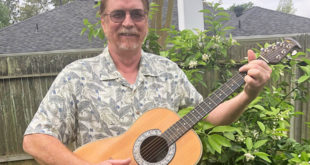Since early childhood, the very mention of “kidney,” never mind “kidney problems,” had triggered feelings of terror within me. Memories of the trauma of my then twelve-year-old brother’s death remain vivid. Only eight at the time, I’d overheard adults talking — the details and their accuracy have always been vague but repeated words such as “kidney failure” stuck!
The current nephrologists repeatedly noted that the causes of my brother’s and my conditions likely had little in common, but that did little to reduce the intensity of my reaction; time had not faded the long-held emotions.
With a condition considered rare, cause unknown, the research nephrologist’s note on my medical record offered encouragement:
“I am confident that Prednisone will reverse the disease process.”
With that to share with my local nephrologist, I returned home where I was greeted by my concerned neighbor. How was I? What had I learned? What was the plan of action? How could he be of help? He understood kidney concerns. Only the year before he had donated a kidney to his sister. It was her second transplant; her severe diabetes had damaged the first, an earlier donation by their brother. This time, she was already so ill that, sadly, she passed away within a few weeks following the transplant. Concerning any regrets over his anxiety and the pain of going through the surgery in order to give the gift (that “failed”), my neighbor simply said,
“It was the right thing to do.” But now, with genuine concern and interest in details, he shifted the focus to me. I mentioned how stunned I had been when, checking my instructions at the famed clinic, I had read, “Renal Transplantation” as the department destination for my next appointment. No one had mentioned transplant! Was this how I was being told what was next? Subsequently, I was assured that it meant nothing more than my being assigned to an available nephrologist who happened to be in that department. Barely convinced, I read the sign on his office door; it shouted otherwise: he was the center’s chief of kidney transplantation.
“Maybe”, I worried, “that meant something about me after all?” Sitting across from the doctor, I fidgeted nervously.
“I suppose I can be glad that this condition developed in my seventies rather than … (I searched for an age) … my twenties,” I said as I attempted to ease the anxious hollow with words,
“I’ve lived my life…” I rattled, trying in the mix to cling to the words of my local nephrologist: “We’re nowhere near dialysis.”
The renowned specialist may have intended his response to be one of hope, I don’t know. What I know is that it triggered a sinking feeling.
“Oh, we do kidney transplants on 70-year-olds,” he offered, “but it has to be from a live donor.” Though nothing indicated that I was anywhere near needing a transplant, my emotions took my thoughts on a desperate spin. Of one thing I was certain: I knew of no one I would even consider asking to make that sacrificial gift.
In his typical empathetic manner, my neighbor listened. When I paused, he gently said,
“I’m sorry I can’t offer you mine. I have none to give. If I did, and you needed it, I would give it to you.” His unhesitating willingness spoke to my heart. Even before his wife reiterated what he’d just said, I believed he would; I had come to know him through his thoughtfulness and kindness – generously expressed, without fanfare, on my behalf as well as for others. Then it hit me: What if all that happened to be so? The proverbial buck would stop with me. How readily – how fully — would I be able to accept his willing gift?
That turned my thoughts to a larger picture: God did have the ONE thing – the ONLY thing — I ultimately needed; He had already willingly given it on my behalf. And then the important question: What was I doing with the Gift?
For God so loved the world that he gave his one and only Son, that whoever believes in him shall not perish but have eternal life (New International Version, John 3.16).
Reference: The Holy Bible: New International Version. Grand Rapids, MI: Zondervan Publishing House, Grand Rapids, MI. 1984. Print.
© 2017 - 2024 ASA. All rights reserved. Click here for content usage information.



